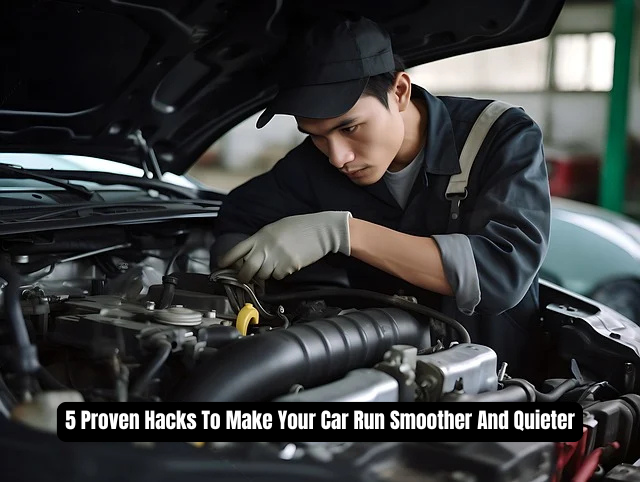Maintaining a smooth, quiet ride increases driving pleasure and helps your car last. Whether you like long road trips or commute every day, simple maintenance tips will help your vehicle perform effectively and lower undesired noise. These five tried and true techniques will enable a more peaceful and quiet ride.
Upgrade to Performance Spark Plugs
Changing your factory spark plugs to high-performance ones is one of the easiest yet most successful tweaks you can do to increase your automobile’s performance and lower engine noise. Performance spark plugs’ more effective combustion guarantees smoother engine operation and less knocking or pinging noises.
Ensuring the threads are in good condition when upgrading your spark plugs is essential. If the threads are damaged, a spark plug thread repair kit can help restore them, providing a secure fit for the new plugs. Installing spark plugs correctly makes the engine more sensitive and saves fuel, which makes the engine quieter and more powerful.
Additionally, lubricant use during installation helps to avoid seizing and facilitates future replacements. Maintaining a smooth-running engine and reducing undesired noise depends mostly on routinely replacing and servicing your spark plugs.
Check and Replace Your Tires
Your car’s general comfort and performance depend heavily on its tires. From tired-out or poorly maintained tires, reduced handling, more road noise, and compromised safety can all follow. You can have a better and quieter ride if you check your tires often for damage and replace them when needed.
Check the correct level of tire filling. Either too low or too high a filling could lead to uneven wear and excessive noise. Frequent rotation allows your tires to wear uniformly, extending their lifetime and maintaining their performance level.
When you replace tires, consider selecting quieter-running versions. Good tires reduce noise, increase grip and handling, and provide a more comfortable and stable driving environment. Maintaining the condition of your tires is the key to a nicer and quieter ride.
Utilize a Grease Gun Needle for Lubrication
Proper lubrication of moving components is essential for minimizing friction and lowering noise in your car. A grease gun needle allows you to apply lubricant exactly to regions that need it, such as suspension components, steering systems, and wheel bearings.
Regular oil application helps these parts avoid wear and tear, guaranteeing smooth operation and silence. A well-lubricated suspension system improves ride comfort and lessens creaks or squeaks resulting from rusted or dry parts.
Utilizing the correct equipment for application and investing in excellent lubricants can greatly reduce your car’s general noise level. Maintaining a quieter and more efficient vehicle requires a basic but useful habit, regular lubrication.
Inspect Electrical Connectors
Electrical problems in your car often cause unexpected sounds and performance issues. Intermittent electrical failures caused by loose or corroded electrical contacts can produce flickering lights, faulty accessories, and odd engine or other system sounds.
Most of the time, however, these issues can be avoided with regular inspections and maintenance of your vehicle’s electrical connections. Wiring Issue Testing Since it can gauge the voltage, current, and resistance of the circuits in your car, you will need a voltmeter to help figure out what’s wrong with your car wiring. Advisable electricians suggest that if you have irritating electrical noise and your system is not functioning as expected.
It could be a percentage of restoring or replacing the wiring connections. Quickly handling electrical problems helps lower noise and improve vehicle safety and dependability. Keeping your electrical system in great shape will ensure a better and quieter ride.
Maintain Your Brakes
One of your car’s most important parts is its braking system; hence, good maintenance guarantees dependable operation and helps avoid undesired noises. Squealing or grinding noises produced during braking often indicate brake pad replacement or brake rotor problems.
Maintaining your brakes’ efficient and quiet operation depends on routinely examining wear and tear. Changing worn-out brake pads and cleaning or replacing broken rotors can reduce brake noise and improve brake performance.
Using a brake bleeder tool also guarantees that your braking system runs free of air bubbles. Good brake maintenance not only helps to lower noise but also guarantees that your car stays safe and responsive when you have to stop.
Conclusion
Getting a smoother and quieter ride calls for both consistent maintenance and calculated enhancements. Your car’s performance and comfort will be much improved by changing to performance spark plugs, checking and replacing your tires, lubricating using a grease gun needle, checking and replacing electrical contacts, and maintaining your brakes, including these tried-on tips in your regular maintenance guarantees that your car stays dependable, effective, and fun to drive for many years.
Investing in excellent supplies like a lubricant, a grease gun needle, and a spark plug thread repair kit can help you further support these maintenance activities and enable you to drive trouble-free and pleasantly every time you hit the road.
Also Read:


